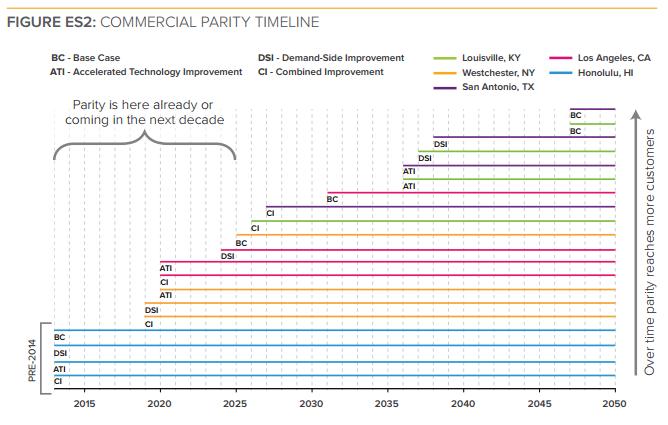Defection
- Desertion from allegiance, loyalty, duty, or the like; apostasy “His defection to East Germany was regarded as treasonable.”
- Failure; lack; loss; “He was overcome by a sudden defection of courage.”
Defection doesn’t have a positive association, it’s either betrayal or failure. Failure to stay connected to the power grid that is, the system that transports power plant electricity to your home, a human invention that may be nearing the end of its time.

In an analyses by the Rocky Mountain Institute and ‘collaborators’ the treat of Solar+Storage is deemed real and present. The logical expectation is that users of solar will go off grid in remote regions the first, as battery storage gets cheaper, and will gradually take over most grid connections around.

Parity is reached when a consumer of electricity can cover his/her energy needs at the same or lower cost using an owned installation than using the grid connection. It is possible this point is reached earlier because of basic insight in the dynamics of climate change.
“Almost one-fifth of Australian households now use solar panels for electricity or hot water, tempted by three- to four-year payback times and national rebates that reduce the upfront cost of a PV system.” (source)
Australia is deemede to be a grid defection hotbed as incentives as not many people use natural gas so an autonomous electricity system would cover all the needs.
A key cost component for solar/wind autonomy is the battery. So far the cost of batteries have been kept high either by market controls such as patents and smearing or reluctance to finance. Lead acid batteries are fine for most home storage but they are kept expensive and a standard recycling process hasn’t been created until now (even though old batteries are 100% recyclable), flowbatteries have been repatented and Edison Nife batteries that last a lifetime have been smeared (in spite of being safer and non toxic).
The activities of Tesla however are proving elusive to financial and patent control, the company doesn’t patent technology that is hard to discover in their devices, so as to not wake the competition up. On the other hand it shares patents for EVs. Now, to make sure it can source the batteries for their future Tesla models, the company is building a mega factory that both doubles the global production capacity and is expected to cut the price of LithiumIon batteries by 30%. According to Morgan Stanley the costs could be reduced by 50-60%.
“Energy storage, when combined with solar power, could disrupt utilities in the US and Europe to the extent customers move to an off-grid approach. We believe Tesla’s energy storage product will be economically viable in parts of the US and Europe, and at a fraction of the cost of current storage alternatives.” (source)
Rocky Mountain Institute Grid Defection Presentation